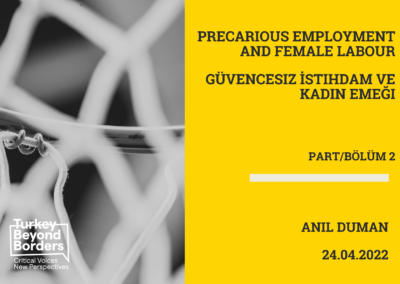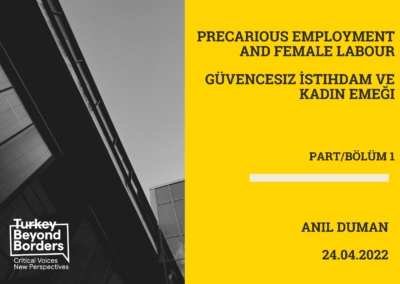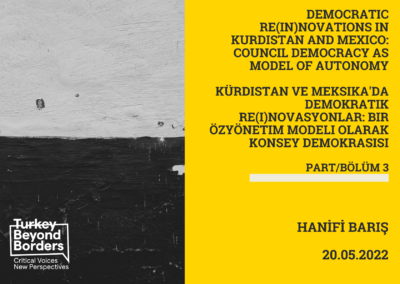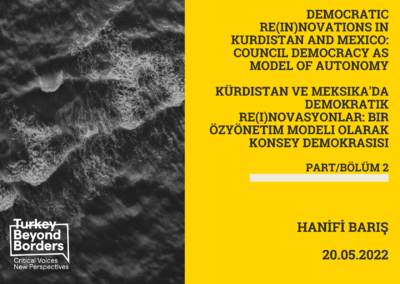Prof. Nazan Maksudyan & Rober Koptaş
- Title: Survivors: Children and Women as Resisting Subjects of Genocide (One Part)
- Başlık: Sağkalanlar: Soykırımın Direnen Özneleri Olarak Çocuklar ve Kadınlar (Tek Bölüm)
- Date: 2 Nov/Kas 2023
Recommended Readings / Önerilen Okumalar
- Abrahamian, A. A., Avedis’ Story: An Armenian Boy’s Journey, C. S. Najarian (ed.), London, Gomidas Institute, 2014.
- Dadrian, V. N. « Children as Victims of Genocide: The Armenian Case », Journal of Genocide Research, 2003/3, n° 5, 421–437.
- Darbinyan, A. and R. Peroomian, « Children: The Most Vulnerable Victims of the Armenian Genocide », in Samuel Totten (ed.), Plight and Fate of Children During and Following Genocide, New York, Routledge, 57–84.
- Derderian, Katharine. “Common fate, different experience: Gender-specific aspects of the Armenian genocide, 1915-1917.” Holocaust and Genocide Studies 19.1 (2005): 1-25.
- Dzarugyan, A. Çocukluğu Olmayan Adamlar (trans. by K. Z. Çelik), Istanbul, Aras Yayıncılık, 2016 [1955].
- Eisen, G., Children and Play in the Holocaust: Games Among the Shadows, Amherst, University of Massachusetts Press, 1988.
- Ekmekçioğlu, L. (2013). ‘A Climate for Abduction, a Climate for Redemption: The Politics of Inclusion during and after the Armenian Genocide’. In Comparative Studies in Society and History 55/3, pp. 522–3.
- Ekmekçioğlu, Lerna. Bir Milleti Diriltmek 1919-1933: Toplumsal Cinsiyet Ekseninde Türkiye’de Ermeniliğin Yeniden İnşası (Istanbul: Aras, 2021).
- Injarabian, P., Azo the Slave Boy and His Road to Freedom, trans. from the French by E. Eaker, London, Gomidas Institute, 2015 [1980].
- Maksudyan, Nazan, Orphans and Destitute Children in Late Ottoman Empire, Syracuse, Syracuse University Press, 2014;
- Maksudyan, Nazan, Ottoman Children and Youth during World War I, Syracuse, Syracuse University Press, 2019.
- Maksudyan, Nazan. “Gendered Violence against Children during the Armenian Genocide,” In ‘For Civilisation’: The First World War in the Middle East 1914 – 1923, edited by Pieter Trogh. (TIJDSBEELD, 2022), 78-83.
- Maksudyan, Nazan. “Bir Avuç Leblebiyi Paylaşan Masal Kahramanları,” [Fairytale heroes sharing a fist full of chickpeas] in Elveda Antura: Bir Ermeni Yetimin Anıları [Goodbye Antoura: Memoirs of an Armenian Orphan] (Istanbul: Aras Yayıncılık, 2018), 389-398.
- Maksudyan, Nazan. “Hem Ermeni Hem Yetimdik / Soykırım Tanıklıklarında Çocukluk ve Büyümek,” [We were both Armenians and Orphans: Childhood and Growing up in Genocide Testimonies] Notos 55 (Dec. 2015 – Jan. 2016): 52-58.
- Maksudyan, Nazan. “The Armenian Genocide and Survival Narratives of Children”, Childhood Vulnerability Journal 1/1 (2019): 15-30.
- Maksudyan, Nazan. “Üç Kuşak Üç Katliam: 1894’ten 1915’e Ermeni Çocuklar ve Yetimler,” [Three generations, three massacres: Armenian orphans from 1894 to 1915], Toplum ve Bilim [Society and Science] 132 (2015): 33-49.
- Maksudyan, Nazan. « The Orphan Nation: Gendered Humanitarianism for Armenian Survivor Children in Istanbul, 1919–1922 », in Esther Möller, Katharina Stornig, Johannes Paulmann (eds.), Gendering Global Humanitarianism in the Twentieth Century: Practice, Politics, and Power of Representation, Cambridge, Cambridge University Press, 2020, 117–142.
- Miller, D. E. and L. Touryan Miller, Survivors: An Oral History of the Armenian Genocide, Berkeley, University of California Press, 1993.
- Panyan, K. Elveda Antura, Bir Ermeni Yetimin Anıları (trans. from the Armenian by M. Fuchs), Istanbul, Aras Yayıncılık, 2018 [1992].
- Sarafian, A., « The Absorption of Armenian Women and Children into Muslim Households as a Structural Component of the Armenian Genocide », in Omer Bartov, Phyllis Mack (eds.), In God’s Name: Genocide and Religion in the Twentieth Century, New York, Berghahn Books, 2001, 209–221.
- Semerdjian, Elyse. “The Liberation of non-Muslim Women and Children in Turkey: Notes on the Question of the Abduction of non-Muslim Women and Children by the Turks, Retained until Today by Muslims By Zabel Essayan.” Journal of the Society for Armenian Studies 28.2 (2021): 235-248.
- Semerdjian, Elyse. Remnants: Embodied Archives of the Armenian Genocide. Stanford University Press, 2023.
- Suciyan, Talin. Modern Türkiye’de Ermeniler: Soykırımsonrası Toplum, Siyaset ve Tarih (Istanbul: Aras, 2018).
- Tachjian, Vahé. “Gender, nationalism, exclusion: the reintegration process of female survivors of the Armenian genocide.” Nations and nationalism 15.1 (2009): 60-80.
- Tachjian, Vahé. “Mixed Marriage, Prostitution, Survival: Reintegrating Armenian Women in Post-Women Cities,” in Women and the City, Women in the City: A Gendered Perspective on Ottoman History, ed. by Nazan Maksudyan (Berghahn, 2014).
- Watenpaugh, K. D., « “Are There Any Children for Sale?”: Genocide and the Transfer of Armenian Children (1915–1922) », Journal of Human Rights, 2013/3, n° 12, 283–295.




